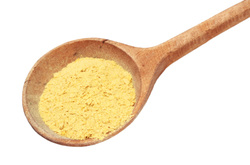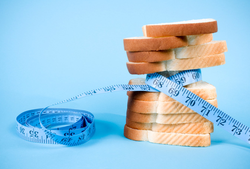 Jenelle Croatto APD After an influx of referrals last week for clients wanting advice on following a Candida Diet to prevent and/or treat thrush, I only thought it was appropriate to discuss the science surrounding this idea. The theory that by following a ‘yeast free’ diet will prevent excessive growth of candida was particularly popular during the 1980’s and was commonly recommended. However it gradually faded as a form of treatment in orthodox medical circles following a study which was released in 1990[1], and subsequent research into the area. One reason that the idea of a ‘yeast free’ diet gained traction is because some women with intolerances to natural food chemicals (most commonly, salicylates) will often experience vaginal irritation and mouth ulcers, sometimes with tongue coating. Based on clinical presentation only, many medical practitioners have come to the misdiagnoses of thrush. To properly diagnose thrush a swab needs to be conducted. If candida has been identified then it is treatable with an anti-fungal agent. However, if the result is negative then diet may be explored as a possible cause of symptoms. Another area of confusion surrounds that of allergy testing. Individuals who present with a positive skin prick test (SPT) to yeast/candida may be lead to think that they are allergic. In fact this is only indicative of exposure, which is universal, and not a clinical diagnosis of an allergy, or a valid reason to commence a ‘yeast free’ diet. At times the line between food and clinical symptoms can be quite blurred, and I can appreciate that it can be tricky to pin point what may be causing issues. For this reason, if anyone is suspecting that they may have some form of sensitivity to food I strongly encourage involvement with a medical practitioner and Dietitian who are experienced in the area of food sensitivities. Following a restrictive diet without the guidance of a Dietitian may lead to a diet that is nutritionally inadequate and inappropriate. [1] A RANDOMISED, DOUBLE-BLIND TRIAL OF NYSTATIN THERAPY FOR THE CANDIDIASIS HYPERSENTIVITY SYNDROME. N Engl J Med (1990); 323:1717-23
0 Comments
 Over the last 20 years people have worked themselves into a frenzy over carbohydrates. The term ‘carbophobe’ was coined to describe those people convinced that carbohydrates are some sort of physique destroyer! Let’s take a closer look at carbs to better understand their role; specifically why we need them for optimal nutrition, what occurs when our body is carb-depleted and how to choose the right kinds of carbohydrates for maximum benefits. I cannot deny that a diet that omits or severely limits carbs will certainly trigger an initial drop in weight… This weight loss, however, is attributed to a loss of glycogen in the muscles, a drop in the body’s normal water content and a loss of some lean muscle tissue. This initial weight loss leads to a feeling of success and people naturally feel as though they are onto a good thing; that cutting carbs is the secret to weight loss. However, the body is clever at adapting and balancing things out and before you know it the lost weight usually returns and is often accompanied by a few extra kilos. Carbohydrates are essential for a well-balanced diet and healthy body. They provide the only fuel source for many vital organs including the brain, central nervous system and kidneys. So without carbohydrates certain organs and systems suffer. Carbohydrates are broken down during digestion into glucose and the pancreas secretes a hormone called insulin to help transport the glucose from the blood into the cells. Without glucose our body becomes lethargic, our brain fails to concentrate and dizziness and nausea can set in. It is clear to see that carbs are essential and that by cutting them out, our overall health and vitality is impaired. Research and population studies around restricting carbs have revealed some rather concerning findings. Very low-carb diets rarely lead to long-term weight loss and if carbs have been substituted with saturated fats (e.g. muesli for fried bacon) than this may lead to some very serious health problems. An increased likelihood of heart disease and bowel cancer are two frightening examples. With a build up of saturated fat in the arteries and a lack of fibre rich wholegrains to keep our bowel moving nicely, opting for low-carb and high saturated fat is not a winning combination. Carbohydrates are critical when it comes to training and sports performance. It is the preferred source of energy for the muscle cells and for those wanting to increase muscle bulk, it’s the carbohydrates that promote protein retention and synthesis. A lack of sufficient carbohydrates makes exercise more difficult; this is because the muscle glycogen is depleted. By cutting carbs you are more likely to tire faster, your endurance will decrease and you are less likely to engage in regular, daily physical activity. It’s often people who follow low carb trends that fail to return to the gym after a few months of yo-yoing success, because they feel extreme fatigue. A lack of carbohydrate over time causes the body to become carb-deplete and the body is forced to rely on other sources of fuel such as fat. Now this may sound like a winning scenario, but it can actually lead to the development of ketones in the body, which can make the body acidic. This can lead to metabolic changes, which can be seriously dangerous for some people with diabetes. Carbohydrates have the ability to stabilise our blood glucose levels, or they can send a person through a dangerous series of peaks and troughs. It’s important to know that not all carbs are the same and it’s important to maintain a steady stream of slowly released carbohydrates into the body rather than rapid influxes which overload the system. The key for maintaining a healthy balance (and sensible weight-loss) is to choose the right carbs, those ‘smart’ carbs. You want to choose carbohydrates that are the least processed - unrefined and closest to their natural state. They include many wholegrains, such as oats, barley, legumes (beans and lentils), buckwheat and quinoa, and wholegrain products such as wholegrain breads and wraps. Many other carbohydrate foods are also slowly released, due to certain characteristics of the food, which slows the process of digestion and absorption eg pasta, dairy products, fruit and certain types of rice. Look for high fibre options and products labeled low GI (these will be released slowly). If you have been wearing that ‘carbophobe hat’ since 1996, than it is time rethink your motives for doing so. The right kinds of carbs can set you on a path to be the best version of you. Your body will benefit form a diet high in fibre and a steady flow of glucose into your bloodstream will minimize those peaks and troughs in energy. The intensity of your training sessions will improve and as an added bonus your brain will be thinking clearer. For too long carbohydrates have been solely blamed a global increase in waistlines. Instead of cutting carbs completely, opt for minimally processed carbs and wholegrains and ditch the highly refined carbs. Carbohydrates play and important role and should be part of a balanced diet rich in plant foods, lean protein and healthy fat. Incorporate ‘smart’ carbohydrates and feel your vitality soar! |
News FEEDFitness, Energy, Education & Diet Archives
June 2020
Categories
All
|
 RSS Feed
RSS Feed